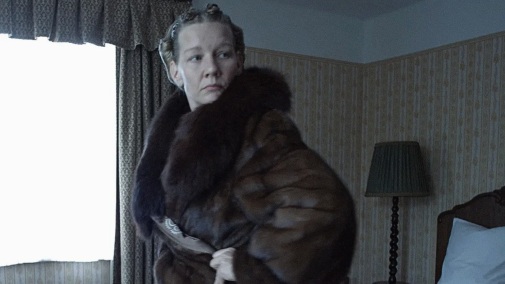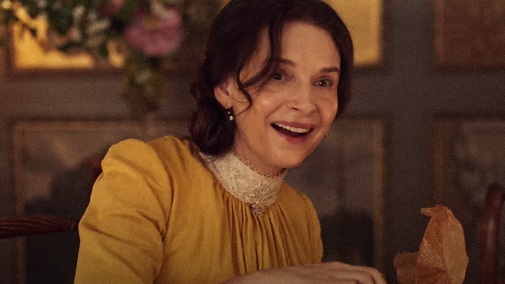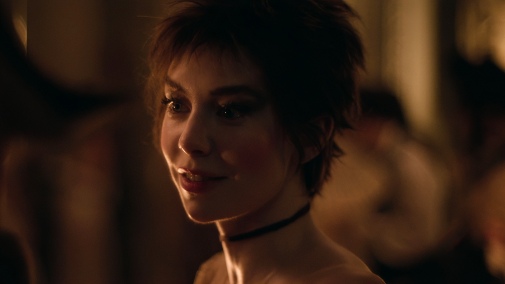More Category Confusion: LEAD or SUPPORTING?
 Thursday, December 28, 2023 at 8:00PM
Thursday, December 28, 2023 at 8:00PM 
Category confusion is always a hot topic in the Film Experience comment section. It's been debated across this awards season, from regional critics honors to the major precursors, from the smallest indie flick to some of the year's biggest blockbuster offerings. So. It's only logical for the LEAD or SUPPORTING polls to make a return. Last time, the lot included Killers of the Flower Moon, Passages, Barbie, and much more. Now, let's redirect our collective attention to newer releases, including the much-discussed May December. Are Charles Melton and Julianne Moore co-leads alongside Natalie Portman? Let's discuss…
I'm inclined to consider May December as a three-lead film. Part of that judgment comes from how Haynes orchestrates his tonal games around the actors, having them perform almost as if each occupies a different register. Portman's hyper-artifice dominates the narrative, but it's essentially countered by Moore's more lived-in thorniness, her projected self-delusion, and melodramatic manipulations. Together, they form a vicious cycle that inspires many uncomfortable laughs. But then comes Melton, puncturing the camp balloon with a sense of actual human cost, all pain and bruised naturalism.
Screentime counts may show that the Moore-Melton duo has fewer minutes on screen than Portman. However, as I stated before, screentime isn't everything. What do you think?

Let's continue our explorations through the season's Oscar contenders. Carey Mulligan comes next for her Maestro performance. The actress's first billing and the film's structure position her as a lead of equal importance to Bradley Cooper's Leonard Bernstein. Still, some would say that Felicia Montealegre is too underdeveloped as a character to be considered a lead, more an extended version of the long-suffering wife archetype than anything else. Thoughts?

Though Michael Mann's Ferrari is, in many ways, another of the director's explorations of constrictive masculinity, the narrative is keen on detours into feminine perspectives. Penélope Cruz is the primary beneficiary of this gambit, having many sequences for herself in Adam Driver's absence. At the end of the day, the story isn't about Laura Ferrari, but the character's importance, paired with Cruz's star power, makes for a lasting impression. Unsurprisingly, when coming out of the theater, most audiences seem to be talking about the Best Supporting Actress contender rather than the putative leading man.

When a major contender divides its tale between actors of disproportionate legacy, the weight of a storied career can be enough for awards bodies to name one lead and the other supporting. Take The Holdovers. The film is about the relationship between a teacher and his student and how they change each other over a despondent holiday season in the early 70s. However, voters have settled on Paul Giamatti as the picture's sole lead, with Dominic Sessa deemed supporting despite them sharing the brunt of the storytelling. Even when accounting for screentime, Giamatti only has six minutes more than his younger costar.

Despite its literary origins in Martin Amis' work, The Zone of Interest is a film virtually dispossessed of narrative. Things happen, but they are presented as quotidian observation, cold and detached, stuck at a clinical distance that goes deeper than the camera's aversion to closeups. Still, in the Auschwitz captain's household, the Höss matriarch is as important as her husband, embodying the picture's poisonous domesticity with even more clarity than the man. If Cristian Friedel is a lead, shouldn't Sandra Hüller be considered one too?

Jumping beyond performances vying for gold, let's assess another Sandra Hüller picture. While the embattled writer accused of murdering her husband is the sun around which everything else orbits in Anatomy of a Fall, the script is generous to the other characters. Indeed, some could argue her silver-haired lawyer and blind son have as much narrative weight. The former has undoubtedly captivated social media, fancam and all. The latter, played by Milo Machado Graner, feels especially important, as the film's resolution and final statement converge on him rather than Hüller's cipher-like figure.


After winning the Volpi Cup in Venice, Peter Saarsgard has been campaigning as a supporting actor for Memory. The film is a two-hander shared between him and Jessica Chastain, with each character bringing different issues with the very concept in the title. To say one of them is above the other, narratively, feels like missing the point.

But then there are those films about relationships where the dynamic is at the center of the film, but one figure takes on an antagonistic role and is therefore deemed supporting. Priscilla and Eileen fit the bill, with Jacob Elordi and Anne Hathaway existing more as ideas than protagonists, helping us understand their leads by colliding with them. Does that make them leads?


On a less volatile or violent note, we have the romance of The Taste of Things. When dealing with such central love stories, it often feels right to consider both parties co-leads. Where does Juliette Binoche fit, then?

Then there's a movie whose dialogue implies an inflated sense of importance that the character's on-screen presentation doesn't corroborate. Josephine is described as central to Napoleon's rule, but Scott's framing of history leaves little space for Vanessa Kirby to deliver on that promise. Maybe it'll be like Kingdom of Heaven, where Eva Green's borderline lead and stupendous turn was obfuscated by butcher-like editing. Her complete characterization only saw the light of day through the director's cut, and the same might happen to Vanessa Kirby in Napoleon.

Now, Talk to Me is nowhere near Oscar talk, but one can still debate its categorizations. After all, Sophie Wilde has been nominated as a supporting actress by more genre-savvy organizations, a placement that makes little sense when one watches the movie. Or maybe it does, and I'm just crazy. What's your take on it?

Finally, for some silly fun, why not debate one of the holiday season's unlikeliest movie stars? Is the giant lizard a supporting character or an inhuman co-protagonist in Godzilla Minus One? I guess this is a question one can ask about most kaiju titles, where the monster drives the picture, but humans get to be our guides into the mayhem.
Please leave your thoughts in the comments, argue for your position on these cases, and mention others that should be added to the discussion.



Reader Comments (20)
The Sophie Wilde as supporting mentions have been wild. She's the central character in a horror film. Are there larger roles for the ensemble cast than usual in Talk to Me? Sure. Does that mean she's not a lead? No. No it does not. Happy to see her mentioned in the rare horror categories, but calling that role supporting is a stretch.
Moore I found to be the least defined of the 3 leads,she is the most backgrounded of the 3 so I deem her supporting,to me Portman is the only Lead,Melton only comes into real focus during the second half,I didn't get the films comedy though except the cake crying scene.
I think you should have covered Nyad as I felt while watching the film it became more of a Jodie Foster Bonnie's journey vehicle but can understand the supporting placement.
Sarsgaard is as much a Lead as Mara was in Carol,he and Chastain are great together shame it's not picking up any steam.
Mulligan is a Lead and I do agree it's a bit of a suffering wife part but whereas I though Blunt stumbled in Oppenheiemer I found Mulligan perfect.
Sessa is a co lead and would make a good nominee as he matches Giamatti every step of the way.
Cruz may steal Ferrari but I think her getting a nomination is wishful thinking same with Binoche and Hullers co stars.
Elordi is borderline and to be honest I thought he was the stronger of the Presley's,Spanaey didn't really impress.
Is Vanessa Kirby good or misdirected or edited so she makes no sense like Blunt in Oppenheimer.
Mulligan is reverse category fraud to me, a supporting role being passed off as a lead in order to create the illusion of gender parity. Which is why she gets top billing and is prominently featured in the marketing. But as Cláudio suggests, the role is underdeveloped despite Mulligan’s best efforts. A glance at Montealegre‘s Wikipedia entry only confirms this.
I fully consider May December a 3-lead film, but it's not the kind of fraud I get worked up about. Portman is the clearest lead, so at least things aren't too out of sorts.
The performance I've seen whose categorization annoys me the most is Sessa, inarguably a lead. That fraud is blatant, and I hope he doesn't steal a nomination, as good as he is.
And I'm heartened seeing performers like Lily Gladstone and Michelle Williams last year, ensure that they're in the right category for the character even when fraud-ing out could lead to a likely win in supporting.
Anyone who considers Moore or Melton as a supporting player in that film has been brainwashed by the normalization of category fraud, full stop, no ambiguity. Might as well start calling Bette Davis a supporting actress in ALL ABOUT EVE or Liv Ullmann a supporting actress in PERSONA!
For me, it's certain as the Sun rising in the East:
Mulligan is as leading as Cooper.
Sarsgaard as leading as Chastain.
I agree it's for debate, but I like Claudio's point about three leads in "May December".
I see Moore completely leading, she's the center and the core of the movie.
I know this is an unpopular opinion, but for me the only way to solve this never-ending controversy is actually applying a screen time % rule.
If someone is on-screen for over 30% of a movie's runtime, they are lead. It could be 25%, 30%, 35% or whatever number, but I'm all for creating a rule that prevents ridiculous cases such as Alicia Vikander or Brad Pitt.
The arguments of "this character is central to the narrative" or "their presence is felt throughout the movie" do not work due to subjectivity. What earns awards is an actor's actual scenes, the moments we do see them doing their work. I'm tired of category fraud every single year, so maybe an objective rule would stop that.
Fbc -- While I understand the frustration, everything about judging art is subjective, and it's erroneous to pretend otherwise.
If one were to implement the 30% rule you propose, these are some of the nominated performances that would have to shift to lead:
Stephanie Hsu, EEAO
Troy Kotsur, CODA
Florence Pugh, LITTLE WOMEN
Kate Winslet, STEVE JOBS
Sylvester Stallone, CREED
Sally Hawkins, BLUE JASMINE
....and many, many others...
Screentime doesn't tell the whole story and there's never an absolute objective answer to these things. At least, that's how I see things.
Fbc & claudio: I think screentime, an objective measure, is the only way to avoid Rooney Mara situations. And if it were deployed, at say, 33%, there would be an appeal process if your team insisted you were supporting.
But I think it would effectively eliminate all the nice situations of actors competing in lead with low screentimes, like Gladstone this year.
So I mostly use the screentime rule to decide how worked up I should get about fraud, and I've found I'm much less excitable now.
How do you compile your own lists.
Even if I don't agree with the placement my nominees always go with the category they where nominated in = Mara though she leads I have her in supporting.
If unnominated I see where most groups had them or look how they were compained.
I never know where to put Scarlett in Lost in Translation though and if I didn't follow Oscar would have Morton for In America in supporting but Oscar has her as a Lead so she goes unnominated.
I think that studios, actors and screenwriters know when a character is lead or supporting. It's just that they play a specifical game for the award season. The only necessary thing to pursue the road to fairness fairness is that more and more actors in the future will raise their voices against the fraud as Pacino or Ladd did in the past. But is it convenient for actors or they have benefits from category fraud?
Claudio & Frank -- hmmm i think arguments saying that a lead is underdeveloped therefore supporting are problematic. If you dont think the writing is strong that's a whole different discusison than whether someone is a protagonist or not. I dont understand why so many people don't like MAESTRO (which I thought was great) but whether or not Felicia is a well written role is totally beside the point. The film is structured around the marriage and she has her own scenes without him. It's a classic two-lead film.
Gallavich - actors, or rather celebrities, benefit greatly from category fraud which is why the big names don't tend to speak up. It's most frustrating for actors who are less famous who have difficulty being included in the category designed for them as a result.
Fbc -- i agree a rule would help though my proposal is billing. If you are one of the two top billed actors you're LEAD unless you appeal (as there are sometimes exceptions to that --some films do only have one lead and arguably a few have no leads --- though true ensemble pictures like, say, Gosford Park, are pretty rare.). In most cases the two with top billing are the leads. They're paid like leads and they're promoted like leads so why should they get easy nominations in supporting?
@ Nathaniel
Point taken, but if a leading role is underdeveloped in the writing/editing/etc despite a good-to-great performance (like Mulligan), then the solution might be not to nominate it in either category. I love you, Carey, but there are stronger leading roles/performances this season.
NATHANIEL R -- I think Mulligan is lead, and agree that the structure supersedes the quality of the writing. To me, her case is similar to Ali in GREEN BOOK, a role that is structurally lead even though the writing fails to flesh him out as it should.
Indeed, I didn't even include Mulligan in the first draft of this article and had Merve Dizdar instead. However, comments in other posts and social media disagreements led me to put her back into the piece. When I say "some would say," I really mean "some other than me." I apologize for not making it clear. I wanted to present all sorts of cases, even those I think go against my judgment.
Beyond that, I like the idea of a fixed rule with a committee to whom actors and studios can appeal in case of disagreement. I like to imagine the likes of Miriam Margolyes as part of that group :P
Late to the party! Very interesting as usual. If supposedly serious people like Gotham buy the Juliette Binoche is supporting narrative, there's very little we can do.
Taste of Things is one of the best films of the year, so delicate and intricate in its emotion, it shouldn't be skipped by anyone, and Binoche is brilliant in her role, once again.
Jodie Foster in Nyad is the ULTIMATE CATEGORY FRAUD of all time. Along with Dominic Sessa. Horrendous category frauds.
Jayden : yes, Nyad and The Holdovers are 2 lead films.
Nathaniel: why do I have this terrible feeling that Mulligan is going to miss on nomination morning? It is my favorite performance of 2023.
Claudio: love your articles - you are such a fantastic writer. I just wanted to clarify something I wrote in an earlier article that jealousy might be a factor in all the hate Maestro is receiving. I should have been more clear. I meant internet hate, not valid film criticism . I respect your opinions immensely. Cheers!
Michael R -- Thank you for those kind words. I appreciate them. Even I, who really dislikes MAESTRO, am finding some of the vitriol a bit too much.
I respect Cooper for trying something formally bolder than the commonplace biopic, even if his final approach feels shallow and often wrong-headed. And yet, while I think his work as a writer and director is full of issues, the performance isn't weak or even comparable to many of the awful Best Actor winners of late. Mulligan, too, seems solid to me. Her limitations are more a consequence of the material than her acting choices, and I even appreciate some of the social and vocal artifice she embodies.
If given a chance, I could write endlessly about all the film's problems. Indeed, I annoyed a friend with a shot-for-shot analysis of around 40 minutes in the middle, looking at the editing and framing choices and how they consider Lenny's queerness. However, even in that hatefest, there would need to be acknowledgments of what MAESTRO does well: the robust nature of its sound mix, the beauty of the music, the pristine costume design, and elegant cinematography by the fantastic Libatique.
Thank you again, especially for your last bit about respecting my opinions. I also respect yours and am always glad to see such feedback in the comments.
I'm revisiting this article after watching TALK TO ME and it's patently insane that anyone would ever consider Sophie Wilde a supporting player in that movie. sorry to those 11% of voters (and the critics orgs who went there) but you be crazy! She's great in the movie and in every sense of the word/term the "lead". There's not even a co-lead present as there often is in large cast pictures.